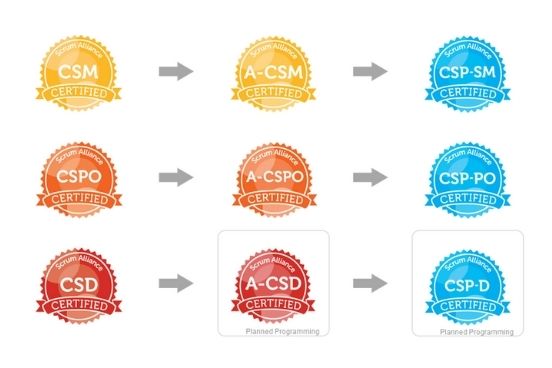The classes described here lead to certifications issued by the Scrum Alliance®, a nonprofit association with more than 1 million practitioners worldwide. Scrum Alliance was founded in 2001, and is the largest, most established and influential professional membership and certification organization in the Agile community, guiding Agile practitioners through every step of their journey, and providing Advocacy, Community, and Education.
For those just starting on their Agile journey, the Certified Scrum Developer® (CSD®), Certified Scrum Product Owner® (CSPO®), or Certified ScrumMaster® (CSM®) is a good place to start. Participants can choose one of these 3 tracks based on their interest in building products, managing product development, or building teams and organizations. All these foundational classes cover Agile values and Agile principles, the fundamentals of Scrum, the intricacies of the Scrum framework, Scrum roles and responsibilities, and the keys to a successful Scrum implementation.
Analysts, UI/UX designers, programmers, architects, engineers, and all team members interested in learning how to use Scrum to build quality products iteratively and incrementally should start with the CSD – Team Member Practices class. This class is a great starting point and is suitable for all team members and does not have any prerequisites. Participants can then follow the journey on the Developer track from foundational to Advanced to Professional Scrum Practitioner based on their skill set.
Programmers interested in learning the technical practices required to succeed in using Scrum can also take the CSD – Agile Engineering Practices class. This class focuses on technical practices like TDD, pairing, test automation, and continuous delivery and requires programming knowledge. Participants can then follow the journey on the Developer track from foundational to Advanced to Professional Scrum Practitioner based on their skill set.
Product Managers interested in learning how to use Scrum to build products that delight their customers should start with the CSPO – Certified Scrum Product Owner class. Participants can then follow the journey on the Product Owner track from foundational to Advanced to Professional Scrum Practitioner.
Functional Managers, Program Managers, or Project Managers interested in building high-performing teams and organizations should start with the CSM – Certified ScrumMaster class. Participants can then follow the journey on the Scrum Master track from foundational to Advanced to Professional Scrum Practitioner.
More details about each certification are below:
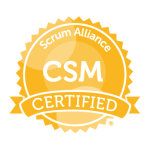
Certified ScrumMaster®: The CSM covers Agile values and Agile principles, the fundamentals of Scrum, the intricacies of the Scrum framework, Scrum roles and responsibilities, and the keys to a successful Scrum implementation. No prerequisites. Suitable for managers interested in learning how to use Scrum to building high-performing teams and organizations.
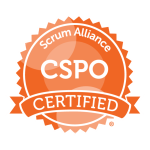
Certified Scrum Product Owner®: The CSPO covers the Agile values and Agile principles, the fundamentals of the Product Owner role, creating a vision, developing a roadmap and release plan, building and managing product backlogs, and working with customers and stakeholders. No prerequisites. Suitable for Product Owners and Product Managers interested in learning how to use Scrum to build products that delight their customers.
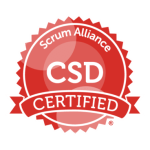
Certified Scrum Developer® – Team Member Practices: The CSD Team Member Practices covers Agile values and Agile principles, the fundamentals of Scrum, the intricacies of the Scrum framework, Scrum roles and accountabilities, and the key skills needed to be able to work successfully on a Scrum team. No prerequisites. Suitable for all team members interested in learning how to use Scrum to collaborate together as one team to build quality products iteratively and incrementally.

Certified Scrum Developer® – Agile Engineering Practices: The CSD Agile Engineering Practices covers the fundamentals of Agile engineering practices and the skills needed to design and build reliable, robust and verifiable systems including Test Driven Development, collective code ownership, automated builds and tests, continuous integration and deployment as well as managing technical debt. Over 70% of this class involves hands-on coding so programming knowledge is required. Suitable for programmers with 1+yrs of coding experience interested in learning the Agile engineering practices required to succeed with Scrum.
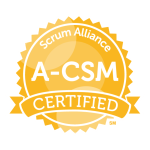
Advanced Certified ScrumMaster: The A-CSM goes beyond the fundamentals of Scrum and provides a deeper understanding of the ScrumMaster role, servant leadership and self-organization; the ScrumMaster’s responsibilities in servicing the Product Owner, the Development team and the organization; as well as advanced facilitation and coaching techniques. Requires CSM + 1 year of experience. Suitable for ScrumMasters and Coaches.
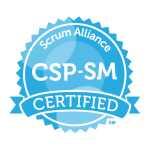
Certified Scrum Professional® – ScrumMaster: CSP-SM dives deeper into advanced Lean thinking, team dynamics and effectiveness, conflict resolution, organizational development, and scaling Scrum. Requires A-CSM + 2 years of experience. Suitable for ScrumMasters and Coaches.
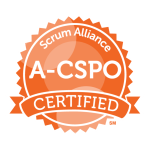
Advanced Certified Scrum Product Owner: The A-CSPO goes beyond the fundamentals of Scrum and provides a deeper understanding of the Product Owner role, stakeholder management and facilitation, product discovery, product strategy, product roadmaps, release management, and advanced product backlog refinement techniques. Requires CSPO + 1 year of experience. Suitable for Product Owners and Business Analysts.
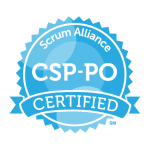
Certified Scrum Professional® – Product Owner: CSP-PO dives deeper into funding and financing, economics of product development, advanced customer research and product discovery, roadmapping at scale, working with multiple Scrum teams, and product launches. Requires A-CSPO + 2 years of experience. Suitable for Product Owners and Business Analyst.
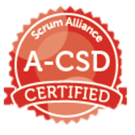
Advanced Certified Scrum Developer – Agile Engineering Practices: The A-CSD Agile Engineering Practices goes beyond the fundamental technical practices and the skills needed to design and build reliable, robust, and verifiable systems and dives deeper into the engineering skills needed to successfully produce a production ready product increment at the end of each and every Sprint. Requires CSD + 1 year of experience. Suitable for programmers with 2+ years of programming experience.
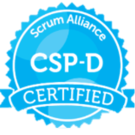
Certified Scrum Professional® – Developer: CSP-D coming in 2023
Ready for your next certification class? Sign up for an upcoming class here or contact us with any questions you might have.
